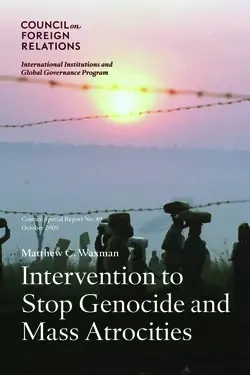
Intervention to Stop Genocide and Mass Atrocities
International Norms and U.S. Policy

- Council Special Report
- Concise policy briefs that provide timely responses to developing crises or contributions to current policy dilemmas.
Overview
On a stone wall at the memorial of the Dachau concentration camp, a promise is written in five languages: "Never Again." Yet in the decades since the Holocaust, in places from Cambodia to Rwanda to Darfur, international actors have failed to mount an effective response to mass atrocities.
The reasons for this failure are numerous. Political will to act, as well as the availability and capability of military intervention forces, is often absent. Moreover, enduring notions of sovereignty make it difficult for outside countries or international organizations to step in, despite considerable acceptance in recent years of the concept of "responsibility to protect."
More on:
Another important part of this debate concerns the international legal system governing the use of force in situations of actual or potential atrocities. In this Council Special Report, Matthew C. Waxman asks whether this legal regime is effective in preventing and stopping such crimes. The report notes that international legal practices constrain swift action and require extensive consultation, especially in the United Nations Security Council, before particular steps can be taken. Waxman, though, argues that the system has certain benefits: it can confer legitimacy and help actors coordinate both military and nonmilitary efforts to prevent or stop atrocities. He also contends that different arrangements of the kind some have proposed would be unlikely to prove more effective.
He therefore opposes wholesale reforms but recommends more modest steps the United States could take to improve the current legal regime. These measures include expressing strong but nuanced support for the responsibility to protect and working with other permanent members of the UN Security Council to discourage the use of vetoes in clear cases of mass atrocities. But the report also argues that the United States must be prepared to act alone or with others in urgent cases without Security Council approval.
With thorough analysis and thoughtful recommendations, Waxman points the way toward an international legal system capable of promoting timely and effective action in cases of mass atrocities. This is a topic central to ongoing debates about the limits of sovereignty and the responsibility of states for their own citizens and others. It is also a subject that must be addressed if "Never Again" is to become a reality rather than a slogan.
More on:
 Online Store
Online Store